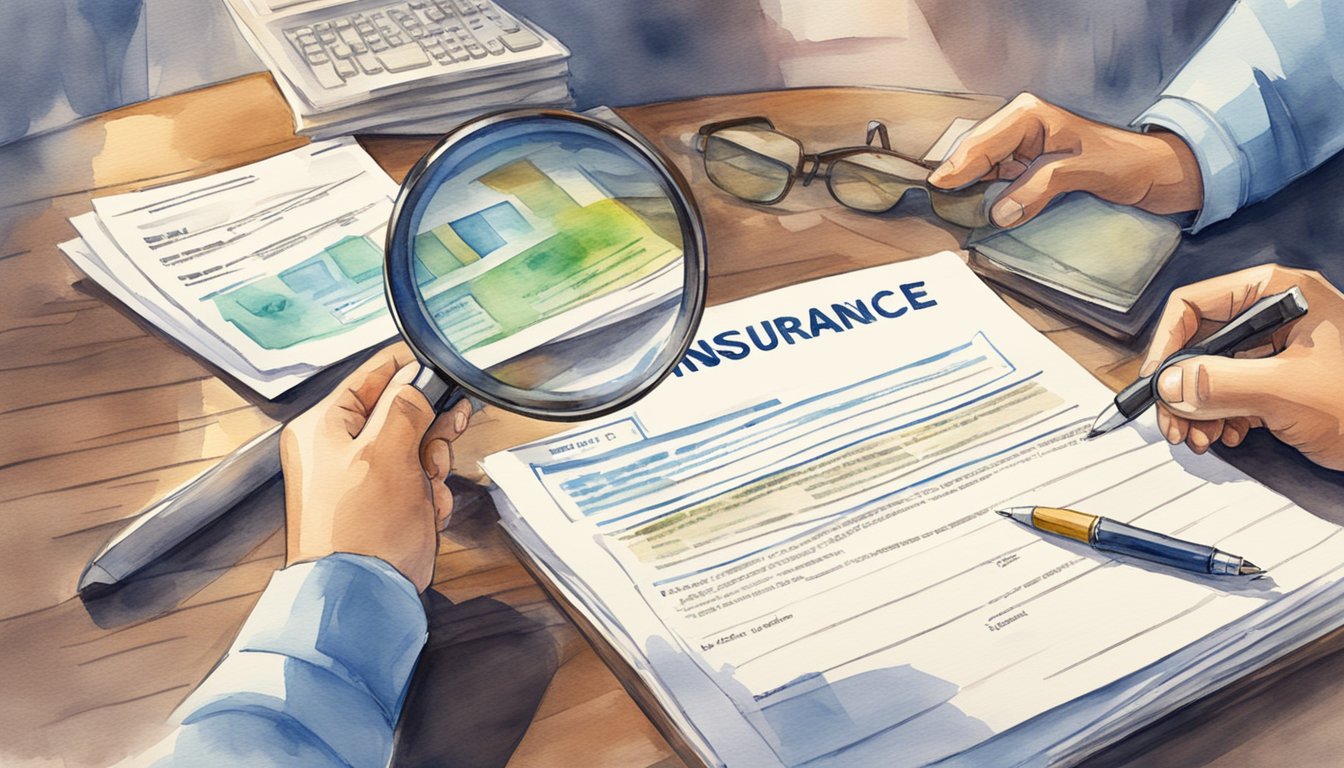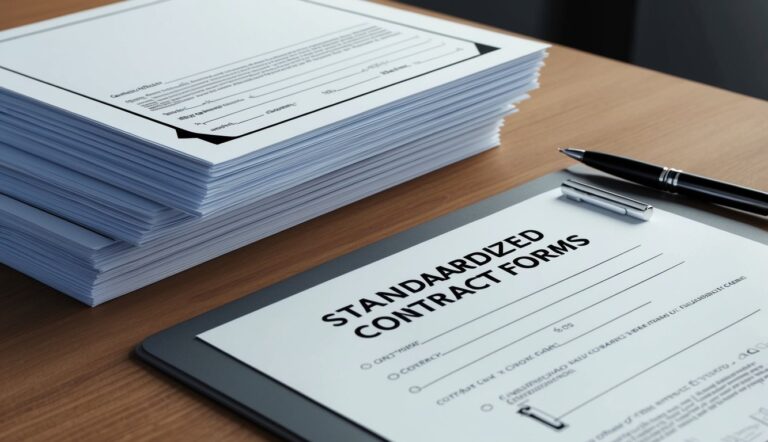Understanding Insurance Terms
Understanding insurance terms is key to navigating the insurance industry.
These terms help you understand how insurance works and what you are paying for in your policy.
Insurable Interest: This term means having a financial stake in the insured asset or person.
You must have an insurable interest to buy an insurance policy.
Insurance Policy: This is a contract between you and the insurance company.
It details what is covered, the premium you need to pay, and how claims will be handled.
Insured: The person or entity covered by the insurance policy.
Insurance: Financial protection against potential future losses.
It involves paying a premium to transfer the risk of loss to an insurance company.
Policy: The document outlining the terms and conditions of your insurance coverage.
Life Insurance: A type of insurance policy that pays out a sum of money to a beneficiary upon the insured’s death.
Property Insurance: Covers damage to property, such as homes or vehicles.
Insurance Companies: Organizations that provide insurance policies.
They underwrite risks and indemnify the insured against losses.
It’s important to understand terms related to insurance to avoid misunderstandings.
The insurance underwriting process assesses risk and determines eligibility for coverage.
Insurance Contracts: Legal agreements where the insurer promises to compensate the insured for specific potential losses.
Risk of Loss: The potential for financial loss if a particular event occurs.
Indemnification: The principle that insurance will compensate you for your loss, putting you back in the same financial position as before.
Most insurance contracts require you to pay a premium and could involve an annual or monthly payment.
Beneficiary: The person or entity designated to receive the benefit from a life insurance policy.
Claims Adjuster: A professional who evaluates the amount of loss to determine how much the insurance company should pay.
Understanding these terms will make it easier for you to manage your insurance policies and ensure you have the proper financial protection.
Consideration of these basic insurance terms can aid in making informed decisions regarding your policies.
Insurance and Business
Insuring your business protects you from financial loss due to unforeseen events.
It is crucial to understand the types of business insurance available and the significance of having insurance in place.
Types of Business Insurance
Various types of insurance are available for businesses. Property insurance protects your business property against loss or damage due to events like fire, theft, or natural disasters (property insurance).
This insurance covers buildings, equipment, furniture, and inventory. Liability insurance protects you from lawsuits or claims resulting from accidents, injuries, or negligence.
It is essential for protecting your business finances and reputation.
Workers’ compensation insurance is required in most places and covers medical expenses and lost wages for employees who get injured on the job (workers’ compensation). Key employee insurance is critical for businesses that rely heavily on specific individuals.
It provides financial support if a key person dies or becomes incapacitated.
This is particularly relevant for partnerships and family-owned businesses where certain members are indispensable.
Importance of Insurance in Business
Business insurance is vital for many reasons.
It safeguards your financial interests by covering losses and liabilities.
In the event of property damage, the right insurance ensures continuity by paying for repairs or replacements, allowing you to continue operations without significant disruption.
Insurance also enhances your business’s credibility.
Clients and partners may prefer to work with businesses that have adequate insurance coverage, as it shows responsibility and reliability.
Policies like key employee insurance also reassure stakeholders that the business will remain stable even if critical members are no longer able to contribute.
Having the proper insurance also helps with compliance.
Lenders and creditors often require proof of insurance before providing financial assistance, ensuring their interests are protected.
Additionally, it can protect against moral hazards by ensuring there are direct relationships and financial interests at stake, thus preventing misuse.
Insurance for Individuals and Families

Insurance provides essential protection for individuals and families, covering critical areas like life and property.
These polices help ensure financial security during unforeseen events.
Life Insurance and Family Protection
Life insurance offers financial protection for your family in the event of your death.
It ensures that your loved ones are financially supported, covering expenses like mortgage payments, debts, and daily living costs.
There are various types of life insurance policies available, including term life insurance, which provides coverage for a specific period, and whole life insurance, which offers lifelong protection.
When choosing a policy, consider your family’s needs, including future obligations like education and outstanding loans.
The beneficiary receives the policy benefit, ensuring that financial support is directed to the intended parties.
Documentation and consent are critical for all policies to avoid any disputes.
Always ensure that you and the insured person understand the terms and conditions fully.
Homeowners and Auto Insurance
Homeowners insurance protects your home and possessions against loss or damage from events like fire, theft, or natural disasters.
This property insurance typically covers the structure, personal belongings, and liability for injuries that occur on your property.
To get a good policy, assess your home’s value and the cost to replace assets.
Insure valuable items separately if needed for full coverage.
Many homeowners policies also include liability insurance, which is crucial for protecting against lawsuits.
Auto insurance provides coverage for your vehicle and liabilities in accidents.
It usually includes liability, collision, and comprehensive coverage.
Ensuring you have adequate auto insurance is vital as it can cover medical bills, property damage, and legal fees.
Regularly review your coverage to ensure it meets your needs and consider additional options based on your driving habits and car usage.
Frequently Asked Questions

This section addresses key concerns about insurable interest, such as legal requirements, sufficiency in life insurance, practical illustrations, and legal consequences.
How is insurable interest legally established?
Insurable interest is established by demonstrating a financial or emotional stake in the continued existence or value of the insured entity or person.
This can involve contracts, family relationships, or business connections.
What constitutes sufficient insurable interest in a life insurance policy?
In life insurance, sufficient insurable interest often means that the policyholder would suffer a loss if the insured person dies.
This can include spouses, parents, and business partners.
In what situations is insurable interest required for property insurance?
Insurable interest is required when you insure property you own, lease, or have a financial stake in, such as a home, car, or business assets.
It ensures insurance applies only when you stand to lose financially if the property is damaged or lost.
Can you illustrate the concept of insurable interest with a practical example?
If you own a home, you have insurable interest in the property.
If it gets damaged by a fire, you would face financial loss, hence you can insure it.
Similarly, business partners can insure each other’s lives to protect the business from potential loss.
What are the legal ramifications of lacking insurable interest in an insurance contract?
Without insurable interest, an insurance contract becomes void.
This means that the insurance company has no obligation to pay out claims, and legal issues can arise, including accusations of insurance fraud.
How does insurable interest differ between various types of insurance policies?
In life insurance, insurable interest must exist at the policy’s inception.
For property insurance, it must exist at the time of loss.
These different requirements ensure the insurance protects legitimate financial interests when a claim is made.






